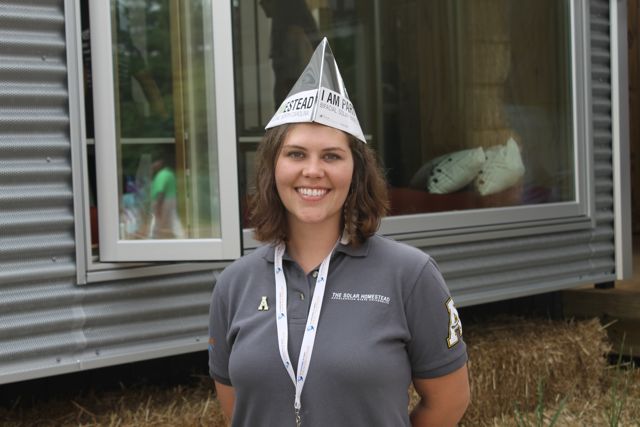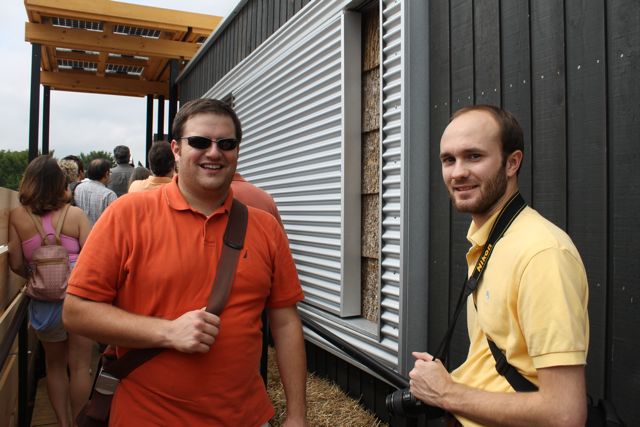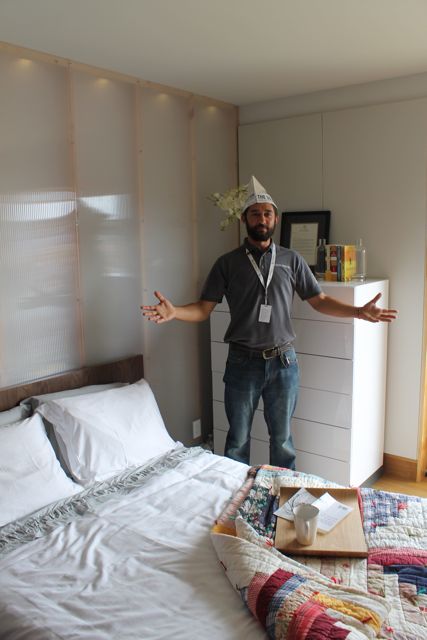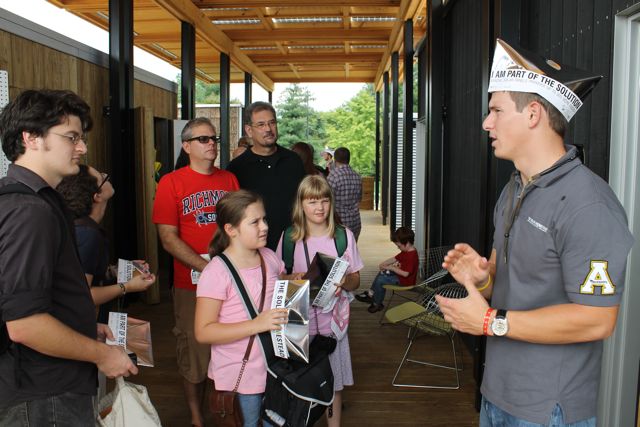Xpress hit the road this past weekend to bring you an opening-day look at Appalachian State University’s entry in the U.S. Department of Energy’s Solar Decathlon — the biannual competition that pits collegiate teams against each other to develop new innovations in solar building technology and install their creations in a “solar village” on the National Mall in Washington, D.C.

The ASU team, including Asheville High grad Janelle Wienke, along with the remaining 18 competitors, have their eyes on the grand prize of $100,000 (and likely a selection of job prospects) when the competition wraps up October 2.

Visitors were clearly impressed by the structure. Ben Thornton, a grad student in architecture at UNC-Charlotte, caught the train in Charlotte at 2 a.m. with friend Josh Henderson so the two could arrive in the morning and take in the solar homestead on opening day, Saturday, Sept. 24. “I’m really proud of them,” Thornton said of the team from North Carolina. “It’s impressive.”
Inspired by the days when isolated homesteads dotted Western North Carolina, the ASU team designed a self-sufficient, “zero-energy” homestead that embraces the future. Their design features a compact, 864-square-foot, two-bedroom home; outbuildings, like those found on old-time homesteads, expand solar-collection possibilities and the structure’s overall square footage.
A highly respected biennial competition, the Solar Decathlon challenges collegiate teams from around the world to design and build innovative, solar-powered dwellings. Each team must create a cutting-edge home that’s cost-effective, energy-efficient and attractive. Then they have to install it in a special, 10-day exhibit on the National Mall.
A multidisciplinary collective of ASU students and faculty were involved in the project, including Wienke, who learned about the project when it was offered as a special course for credit. Small groups of students took on individual projects, such as developing the home’s unique, two-faced solar panels (which collect direct sunlight from above, plus reflected sunlight from below, thus boosting solar capture by 30 percent). Another took on a reinvention of the Trombe wall, a “thermal mass” that collects solar energy and slowly releases heat to the interior. Yet another group built several required small-scale models of their homestead’s final design. Sacrificing holidays and weekends, many core team members worked 100-hour weeks to meet project deadlines, according to Dave Lee, a graduate student in appropriate technology.
“It’s a huge honor for ASU,” says Wienke. “We’re one of two teams chosen that doesn’t have an architecture or engineering program.” What’s more, she emphasizes, “This is really a student-designed, -built and -run project.”

Lee headed up a team that raised more than $700,000 from major donors; the N.C.-based Lowe’s kicked in $350,000. On opening day at the Decathlon, Lee was stationed in the home’s master bedroom, providing a review of the room’s energy-saving lighting and other features.

Lee beams as he shows off the framed letter from Governor Beverley Perdue, endorsing the team’s accomplishments.

In the dwelling’s airy living-dining room, ASU student Chelsea Royall highlighted historic photos of Appalchian homesteads that provided inspiration for the team’s design for home. The room employs a key space-saving device: the wooden end tables up-end to become dining chairs, and the central coffee table pulls up and out to become a full-size dining table. Flooring throughout the home was milled from 200-year-old white oaks that were recently fallen, and donated by the Biltmore Estate.
Among the Solar Decathlon’s goals is spawning innovation in solar engineering and design; Lee cites several the ASU team developed. Instead of a conventional water heater, for example, they used a tank filled with paraffin wax, which stores heat more efficiently. An enclosed coil transfers the heat, harvested from the sun, to the water pumped through it for domestic use.
Aesthetics also influenced the home’s design. Its photovoltaic panels, for instance, are placed on a “solar canopy,” creating a large, airy porch that recalls those found on old-time mountain cabins. The porch also features an outdoor sink and shower.
“A lot of solar panels are just sort of tacked onto a roof,” Wienke explains. “We didn’t think that was the most attractive way. The unique aspect of our panels is they are bifacial: They collect energy from both sides (that is, direct solar energy from above and reflected light from below) … and they let this great light filter through.”
Such innovations also give the university a tangible entrepreneurial boost. ASU already holds two patents for advanced technology, notes Lee; this project will enable the school to apply for four more, “so they’re tripling the intellectual property of the university.”

The hard work paid off, though; by this spring, the team had survived two elimination rounds, and Lee says they’re well-positioned to stack up against the competition. Throngs of visitors pass through ASU’s “solar homestead” where it stands in the village along the scenic Potomac River. Each visitor receives an innovative flyer detailing the homestead’s features: presented as a folded hat, it gleams with reflective silver material intended to engage visitors in bringing a little extra reflected light to the two-faced solar panels overhead in the porch roof.
For a virtual tour of the ASU entry, click here. And through September 30, anyone can log on and vote for their favorite house at the Decathlon’s “People’s Choice Award” page. The People’s Choice Award winner will be announced Oct. 2.




Before you comment
The comments section is here to provide a platform for civil dialogue on the issues we face together as a local community. Xpress is committed to offering this platform for all voices, but when the tone of the discussion gets nasty or strays off topic, we believe many people choose not to participate. Xpress editors are determined to moderate comments to ensure a constructive interchange is maintained. All comments judged not to be in keeping with the spirit of civil discourse will be removed and repeat violators will be banned. See here for our terms of service. Thank you for being part of this effort to promote respectful discussion.